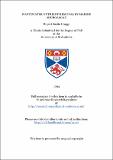Wastewater nutrient removal by marine microalgae
Abstract
Although, microalgal wastewater treatment systems represent an efficient and economical alternative to conventional processes, the use of marine microalgae to remove nutrients from wastewaters has not been extensively researched and few studies have been made in temperate and high latitude areas, where climate may limit treatment. In this study, 102 marine microalgal species, including 66 local endemic isolates from St Andrews Bay, Fife, Scotland, were screened under batch and continuous culture. Species were selected for their ability to remove high concentrations of ammonium and ortho-phosphate from primary treated sewage (diluted 1:1 with sterile seawater) while remaining dominant in culture. Abiotic removal of ammonium and ortho-phosphate at high pH was found to be low from saline media, indicating that much of the nutrient removal from the seawater:wastewater mixture was by algal uptake. Many of the best-treating species grew over a wide range of temperature (10-25 °C), and their growth was not inhibited by the low salinity of the 1:1 diluted wastewater. Seven best-treating species continuously removed >80 % ammonium and >70% ortho-phosphate when cultured in 20 litre mini-ponds (modelled on high-rate ponds) under ambient summer conditions over two weeks. These were all endemic isolates including six bacillariophyceaen isolates (of which three were strains of Phaeodactylum tricornutum), and a species of the cyanophyceaen Oscillatoria. Two isolates (Oscillatoria and an unidentified bacillariophyceaen SA91B33) with adherent properties, continuously removed 100 % of both ammonium and ortho-phosphate when tested in a corrugated raceway designed to provide a large surface area for attachment. Preliminary experiments further showed the best-treating species to be capable of removing nutrients from eel aquaculture effluent. The abilities of marine microalgal species to remove high concentrations of nutrients, remain in unialgal culture and grow over a range of environmental conditions are indicative of their potential for use in wastewater treatment systems in temperate areas.
Type
Thesis, PhD Doctor of Philosophy
Collections
Items in the St Andrews Research Repository are protected by copyright, with all rights reserved, unless otherwise indicated.

